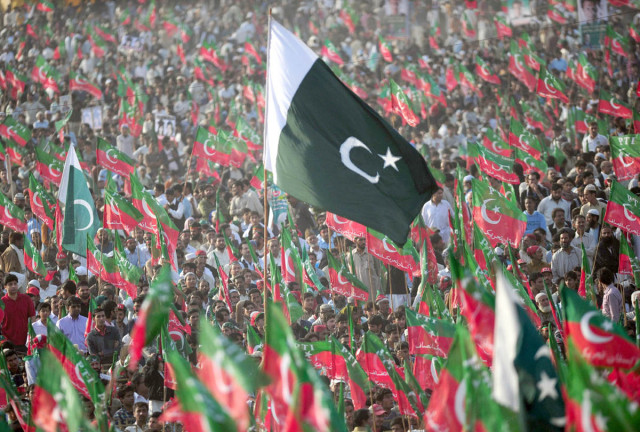SC seeks political parties’ advice on curtailing electioneering expenses
Petitioner says current practices exclude common people from contesting polls as campaigning needs heavy expenditure.

The court was hearing a petition filed by senior apex court lawyer Abid Hasan Minto, who said that the expenses incurred by political parties for electioneering should be regulated and parties should be barred from holding huge rallies and putting up banners. The parties, he proposes, should be given equal attention on state television and conduct door-to-door campaigning.
On Tuesday, in compliance with the court’s earlier order to him, Minto presented the three-member bench with a list of political parties he had obtained from the Election Commission of Pakistan (ECP). “The ECP has no objection over my petition,” Minto told the bench, headed by Justice Shakirullah Jan. “As per the ECP’s record, currently only 26 political parties are functioning in the country.”
The court, accepting the list, asked the parties’ representatives to submit written replies before the court between seven and 20 days. Pakistan Muslim League-Nawaz’s Nasir Bhutta, Jamat-e-Islami’s Saifullah Gondal and Awami National Party’s Haji Adeel and Afrasiab Khattak were also present in the court.
While issuing the notices, Justice Jan said the court appreciated all those political parties’ representatives who attended its Tuesday proceedings in honour of the court.
During the hearing, Attorney-General of Pakistan Maulvi Anwarul Haq submitted a fresh report on behalf of the ECP and said that the commission will ensure compliance of court orders at any cost. The court has asked the ECP to compile transparent electoral rolls by February 25 so that by-polls can be held in required constituencies.
Justice Tariq Pervez said that whenever the court resumes hearing, the ECP begins convening meetings to discuss progress. “ECP officials are making a mockery of the court’s instructions,” he said disapprovingly.
Hearing was adjourned until February 29, when the court will take up all election-related petitions, including those filed by Minto, PML-N’s Iqbal Zafar Jhagra, and that pertaining to the ECP and voter lists.
Political parties reaction
PML-N’s Bhutta said that his party was yet to receive the court’s notice. Registering his own complaint over voter registration, Bhutta said that the National Database and Registration Authority had introduced a confusing system and asked the court to also hear Jhagra’s petition, which was filed on behalf of the PML-N.
ANP’s Adeel sought 15 to 20 days to file a reply, saying that the party’s central committee’s decision was necessary to submit a response.
Senators Adeel and Khattak also requested the court to issue the legal points, which were raised by Minto’s petition in order to assist them in submitting a reply. Justice Tariq Pervez said that Minto’s stance is that the current election method is not conducive for everyone and the common man is not inspired to contest elections due to extravagant and expensive election campaigns.
Appreciating Minto’s petition, Gondal said that his party will submit a reply through its counsel within the given time.
Minto’s stance
Arguing his case before the court, Minto said that the practices and processes currently permitted and employed in holding elections are unconstitutional and unlawful and make it impossible for anyone except a certain class of people to participate in the political process.
Minto, who is also the president of the Workers Party Pakistan, said that the overwhelming majority of the country’s citizens can never aspire to achieve their legitimate social, economic and political objectives by participating in governance unless unconstitutional practices currently underlying the process of elections are restrained or remedied. “That is the sole object of this petition,” Minto said.
“It [the current electioneering process] has been permitted to heavily tilt in favour of retrogressive forces whose sole agenda is perpetuation of the status quo that guarantees their hegemony over the politics of this country by preventing the vast majority of Pakistani citizens from meaningfully participating in the electoral process,” Minto held in his petition.



















COMMENTS
Comments are moderated and generally will be posted if they are on-topic and not abusive.
For more information, please see our Comments FAQ